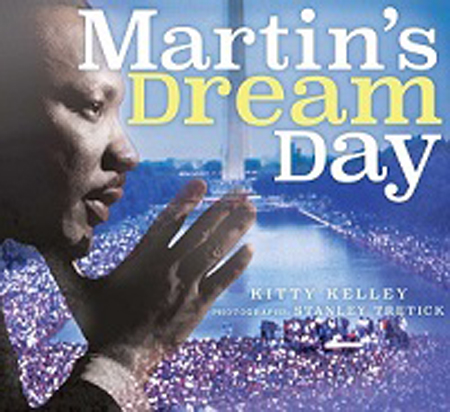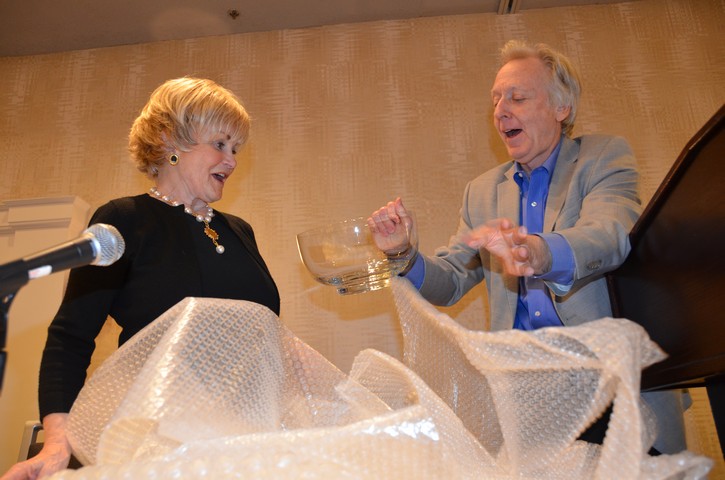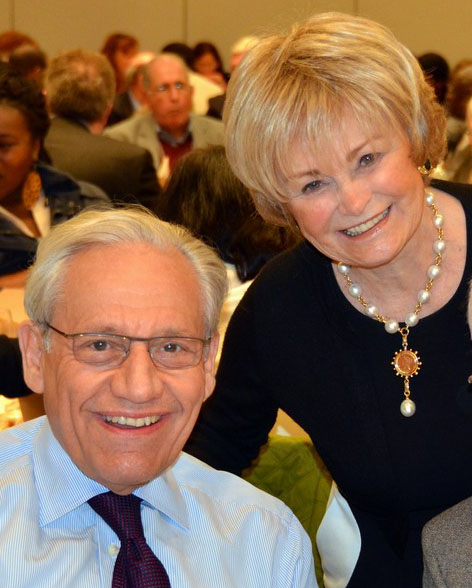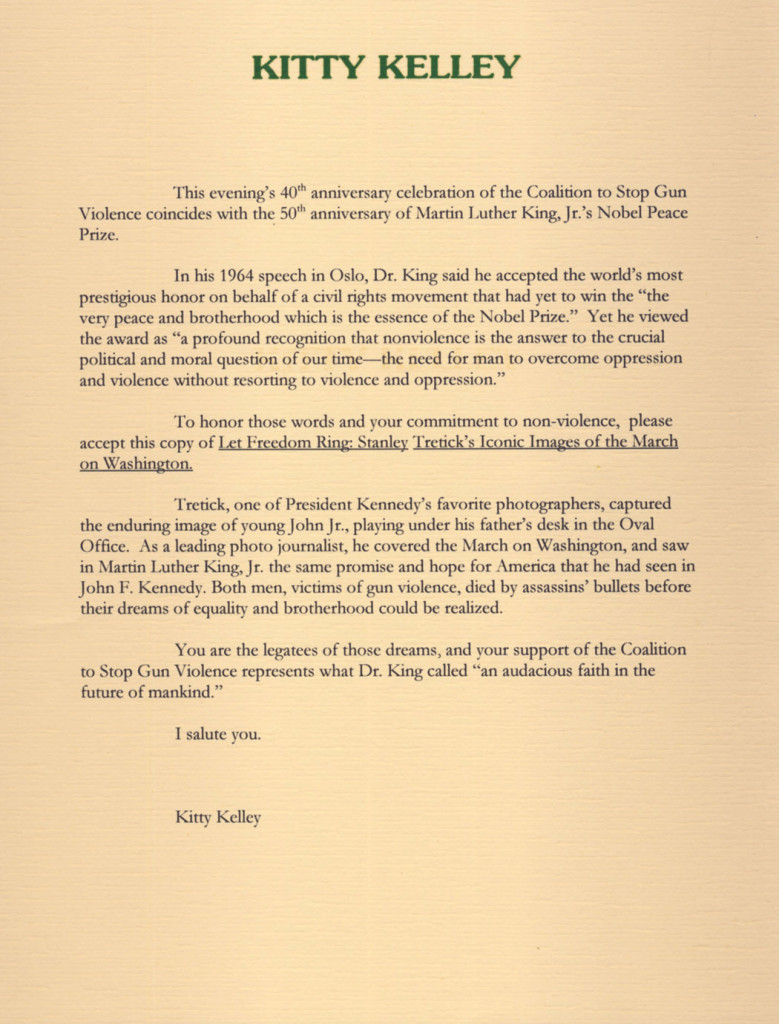The Nine of Us: Growing Up Kennedy by Jean Kennedy Smith
by Kitty Kelley
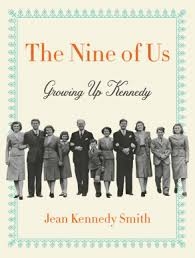 With hundreds of Kennedy books bending library shelves (I’ve written two: Jackie Oh! and Capturing Camelot: Stanley Tretick’s Iconic Images of the Kennedys), another seems like one more shamrock in Ireland — not needed for greening the landscape. But a memoir by 89-year-old Jean Kennedy Smith, the last surviving member of that storied family, might prove irresistible. Like one more chocolate in a binge. So why not?
With hundreds of Kennedy books bending library shelves (I’ve written two: Jackie Oh! and Capturing Camelot: Stanley Tretick’s Iconic Images of the Kennedys), another seems like one more shamrock in Ireland — not needed for greening the landscape. But a memoir by 89-year-old Jean Kennedy Smith, the last surviving member of that storied family, might prove irresistible. Like one more chocolate in a binge. So why not?
Caveat emptor: Don’t expect startling revelations or piercing insights. Reading The Nine of Us: Growing Up Kennedy is like sitting down with your great-grandmother to look at a scrapbook of old photographs taken with a Brownie camera loaded with Kodak film. A relic from a bygone era. Sweetly nostalgic.
You begin by already knowing the popular lore: “the nine” are Joe, Jack, Rosemary, Kathleen (aka “Kick”), Eunice, Pat, Jean, Bobby, and Teddy — the four sons and five daughters born to Joseph P. Kennedy Sr. and his wife, Rose Fitzgerald Kennedy, who lived to see the pinnacle of their most cherished aspirations when their second-born son, John Fitzgerald Kennedy, became the first Catholic president of the United States, and Irish Catholic at that.
This thin reverie of a book underscores the Irish Catholic heritage that produced the nine Kennedy children who grew up in the 1920s, 1930s, and 1940s pre-Vatican II era of Latin Masses every Sunday, meatless Fridays, grace before meals, and evening prayers.
Growing up in the 1950s, I, too, was taught by nuns to memorize, memorize, memorize — the Baltimore Catechism, not the world atlas. I can hardly locate Afghanistan on a map, but I’m still able to recite why God made me: “to know, love and serve him in this world and be happy with him in the next.” All by way of explaining why I might be more tolerant than most of Smith’s tendency to render verbatim the prayers and poems of her childhood as well as the Beatitudes from the Gospel of St. Matthew.
Smith recalls the visit Cardinal Eugenio Pacelli, later Pope Pius XII, made to their home in Bronxville, where he sat on the sofa and held 4-year-old Teddy on his knee. Rose Kennedy later had a plaque made and mounted on the back of the sofa to commemorate the event. The author also relates her mother’s executive organizational skills in handling various childhood illnesses like measles, mumps, and chickenpox.
“Why spend the year cycling child after child through the flu…If one of us came down with a contagious illness, it simply made sense to her that the rest of us should come down with it too…So as soon as the doctor stepped from the room of a sibling to report an infectious disease, the rest of us were hustled inside by Mother to play…Within a week the sickness was out of the house for good.”
In previous books, Rose Kennedy has been dismissed as priggish, pious, and humorless, but her youngest daughter also shows her to be devoted to continual self-improvement for her children as well as herself. Even into her 90s, she was still trying to master a second foreign language. She lived to be 104.
At first, I assumed this slight book was ghostwritten but, as no other writer is named, perhaps not. Still, I agonized for whoever did the writing because the poor soul seemed to have no access to fresh material — no personal diaries, fulsome letters, or unpublished photographs.
Instead, the writer had to plunder the public record, cribbing a great deal from The Patriarch: The Remarkable Life and Turbulent Times of Joseph P. Kennedy by David Nasaw; Rose Kennedy’s memoir, Times to Remember; and Hostage to Fortune: The Letters of Joseph P. Kennedy, edited by Amanda Smith.
As the first journalist to reveal the pre-frontal lobotomy performed on Rosemary Kennedy, I have always been impressed by how the family used that tragedy to support their commitment to mental health. The Nine of Us does not ignore the experimental surgery, which Jean Kennedy Smith writes, “went tragically wrong…Rosemary lost most of her ability to walk and communicate,” adding that her father, who had sanctioned the procedure, “remained heartbroken over the tragic outcome…for the rest of his life.”
Yet Smith omits revealing her mother’s bitterness about what her father had done without consulting her or anyone else in the family. In her book The Fitzgeralds and the Kennedys, Doris Kearns Goodwin quotes Rose Kennedy at age 90: “He thought it would help [Rosemary]. But it made her go all the way back. It erased all those years of effort I had put into her. All along I had continued to believe that she could have lived her life as a Kennedy girl, just a little slower.”
Such a sin of omission — and there are many throughout the book — mars this memoir and keeps it from being more than superficial gloss.
Crossposted from Washington Independent Review of Books
Kitty Kelley Publishes Her First Children’s Book
Kitty Kelley’s first book for children will be published January 3, 2017 by Atheneum Books for Young Readers, an imprint of Simon & Schuster Children’s Publishing. Martin’s Dream Day tells the story of the 1963 March on Washington, illustrated by Stanley Tretick’s photography.
“Martin Luther King dreamed of making justice a reality for all God’s children so it seemed right to share the images of his dream day with children,” said Kelley.
Ages 5 and up.
Read press release here.
Kitty Kelley will donate her proceeds from this book to Reading Is Fundamental, the largest nonprofit children’s literacy organization in the United States.
Buy in hardcover or in ebook format.
BIO Conference June 2016
Kitty Kelley participated in a panel at the the Biographers International Organization Conference in Richmond, June 3-5, 2016.
Photo, left to right: Jeffrey Frank (Ike and Dick), Amanda Vaill (Everybody Was So Young), Thomas Mallon (Henry and Clara), Kitty Kelley, James Atlas (Delmore Schwartz), Anne Heller (Ayn Rand and the World She Made)
Washington Independent Review Lifetime Achievement Award
Kitty Kelley received the 2016 Lifetime Achievement Award from the Washington Independent Review of Books. The award was presented at the 4th annual “Books Alive!” Washington Writers Conference on April 30, 2016. The following are her remarks.
For the last 40 years I’ve chosen to write biographies of people who are alive and influence our world. I’ve done this without their cooperation and independent of their demands and dictates. These people are not simply celebrities, but titans of society who have affected us as individuals and left an imprint on our culture, sometimes for better, sometimes for worse.
With each biography, the challenge has been to answer the question John F. Kennedy once posed: “What makes journalism so fascinating and biography so interesting is the struggle to answer that single question: ‘What’s he like?’”
I believe that the best way to find out is to tell a life story from the outside looking in, and so I choose to write with my nose pressed against the window rather than kneeling inside for spoon feedings.
Championing the independent or unauthorized biography might sound like a high-minded defense for a low-level pursuit, but I do not relish living in a world where information is authorized, sanitized and homogenized. I read banned books. I applaud whistleblowers. I reject any suppression by church or state. And I believe in freedom of the press. To me the unauthorized biography, which requires a combination of scholarly research and investigative reporting, is best directed at those figures, still alive, who exercise power over our lives.
In writing about contemporary figures, I’ve found that the unauthorized biography avoids the pureed truths of revisionist history, which is the pitfall of an authorized biography. Without being beholden to the subject or bending to editorial control, the unauthorized biographer is better able to penetrate the manufactured public image. For, to quote President Kennedy again, “The great enemy of the truth is very often not the lie—deliberate, contrived and dishonest—but the myth—persistent, persuasive and unrealistic.”
Despite my lofty defense of the unauthorized biography there’s no question that it exacts a price. The authorized biographer is often hailed as a white knight while the unauthorized biographer is usually demonized. It’s the difference between poodles and pit bulls. One is adored—the other avoided. Authorized biographers are like seraphim—the angels who stand to give praise. Unauthorized biographers are like what John Boehner recently called Ted Cruz. You can understand why I keep an old cowboy motto above my desk that says—“Tell the truth but ride a fast horse.”
I still dream about going to the same heaven as authorized biographers but I’m probably headed for whatever awaits the unanointed. I’m afraid I’ve toiled too long on the unauthorized side of the street to ever hear the angels sing. But this award for telling the truth and riding a fast horse will keep me galloping forward —with great pride.
Thank you very much.
(All photos by Bruce Guthrie.)
David O. Stewart, president and chair of the board, presented the award to Kitty Kelley.
Kitty Kelley with keynote speaker Bob Woodward.
Kitty Kelley on Frank Sinatra
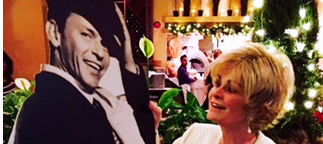
Who would’ve thought that we’d be here tonight celebrating the 100th birthday of Frank Sinatra???
Some of you were with me thirty years ago when I was researching his life story and Sinatra sued to stop me. He said then that only he alone or someone he authorized had the right to write about his life. The day he hit me with his $2 million lawsuit was the day I fully understood what the First Amendment was all about.
it hadn’t been for the support I received from writers groups around the country like the Reporters Committee for Freedom of the Press, Sigma Delta Chi, the Newspaper Guild, PEN, the American Society of Journalists and Authors, the National Writers Union, the Council of Writers Organizations and Washington Independent Writers, I could not have written this book. So I remain profoundly grateful to those writers who understood how a powerful man with money and influence could try to exercise prior restraint and bury a writer before she had written a word.
After a year-long battle Frank Sinatra finally dropped his lawsuit and His Way: the Unauthorized Biography of Frank Sinatra was published. Now it’s been updated and re-released to coincide with his centennial.
For me the best part of tonight is that the life story of a man with only 47 days of education before he dropped out of high school in Hoboken, New Jersey will benefit Reading is Fundamental. This organization is the largest non-profit for children’s literacy in the United States. So the more books you buy tonight, the more books Reading is Fundamental can put in the hands of poor children who’ve never owned a book. Possessing their own books will help them learn to read and to become literate, and their literacy will benefit all of us. Now even Frank Sinatra could not object to that.
So let’s hoist a glass to Ole Blue Eyes and to the First Amendment and to all those who made this evening possible.
Kitty Kelley made these remarks at a party and book signing celebrating the release of the Frank Sinatra centennial edition of His Way: The Unauthorized Biography of Frank Sinatra. The event took place on December 9, 2015 at i Ricchi restaurant in Washington DC.
Frank Sinatra Centennial "His Way"

A new edition of Kitty Kelley’s His Way: The Unauthorized Biography of Frank Sinatra has been released for Frank Sinatra’s 100th birthday, December 12, 2015. This edition has a new Afterword. The re-release was celebrated with a book signing at i Ricchi in Georgetown in D.C. for the benefit of Reading Is Fundamental.
Reissued in honor of Frank Sinatra’s 100th birthday, HIS WAY: The Unauthorized Biography of Frank Sinatra (A Bantam Trade Paperback Reissue) is #1 New York Times bestselling author Kitty Kelley’s backstage pass into the life of one of the most extraordinary and complicated men to fill the public consciousness. Featuring a new afterword, this reissue shares Kelley’s insider take on developments in the Sinatra estate since the book’s original release: the commercialization of the Sinatra brand by his children after his death; the feud between Frank’s children and his fourth and final wife, Barbara Sinatra; the ongoing spectacle of alleged paternity questions; and even the impact of the book itself on Frank’s life and career.
Slap Fest
Kitty Kelley wrote a Letter to the Editor of the Washington Post taking issue with George Will’s attack on her book Nancy Reagan in his critique of Bill O’Reilly’s Killing Reagan.

(Thanks to Patrick W. Gavin @pwgavin for tweeting the photo.)
Burying Gore Vidal
See Kitty Kelley’s “Gore Vidal’s Final Feud” in the November 2015 Washingtonian magazine for an account of the consternation caused by Vidal’s final disposition of his wealth and property: “Given his penchant for dissent Vidal–who died in 2012–would be smacking his lips to know that, between his death and this fall, there has been a bitter fight over his will pitting distant relatives against one another.”
Update 11/9/15: The article has been posted at the Washingtonian website here.
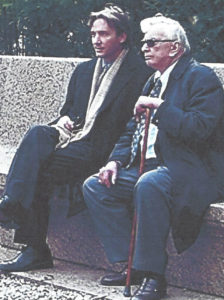
Photo: Gore Vidal with Burr Steers, son of Vidal’s half-sister Nina Auchincloss Straight.
Joe Biden Interview by Kitty Kelley

Washingtonian magazine posted online Kitty Kelley’s “Death and the All-American Boy” (June 1974) as part of its 50th Anniversary collection.
The article attracted some new media attention.
See Gawker, Sept. 26, 2015.

See also the Huffington Post, Sept. 30, 2015.
Coalition to Stop Gun Violence
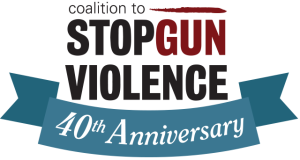 Kitty Kelley spoke on December 8, 2014 at the Coalition to Stop Gun Violence 4oth Anniversary Celebration in Washington D.C.:
Kitty Kelley spoke on December 8, 2014 at the Coalition to Stop Gun Violence 4oth Anniversary Celebration in Washington D.C.:
This is an evening I’ve been looking forward to because it gives me a chance to be in a room with people I consider royalty who are enlightened and represent a sense of values that I have long admired. So I come here tonight to pay tribute to each of you for your commitment to stop gun violence.
I salute you because you have refused to be defeated by huge odds. You have not become disillusioned by the political failure in this country to legislate gun control; you have not been intimidated by the N.R.A. You have stood tall and you have not wavered. You are clear-eyed about the obstacles but you focus on your high purpose, which is to bring us back to our humanity. And in the words of that old spiritual sung by those who marched for Civil Rights–you shall not be moved.
Everything about this organization underscores humanity. You named yourself a “coalition” which by its very definition embraces outreach to others–of different religions, different regions, different races. Your roots spring from the hopeful days of the Civil Rights movement for justice and equality. To date your organization covers 47 different organizations which share your mission of non-violence. One purpose, many people.
When President Kennedy addressed the nation on Civil Rights in 1962, he said, “This is not a legal or legislative issue alone. We are confronted primarily with a moral issue. It is as old as the scriptures and as clear as the American constitution.”
But old as it might be and clear as it might seem, it sometimes looks impossible to achieve. Yet Martin Luther King, Jr., never lost hope. He told us that “the arc of the moral universe is long but it bends towards justice.” He said that arc would lead us to a place of peace for all humanity. He called the place the Beloved Community.
And tonight I feel like I am in the middle of that Beloved Community because for 40 years you have given your time, your talent and your treasure to stop gun violence. You have held faith in the worst of times even as we are still reeling from Ferguson, Missouri, and Trayvon Martin and too many school shootings to recount.
Some days it’s hard to believe that the arc of the moral universe is ever going to bend, but this Coalition keeps us on course, and remind us in the words of Abraham Lincoln that “To sin by silence makes cowards of men.” This Coalition helps us all be brave, to stand up, to speak out, and to not be moved.
Your mission is more than an act of faith, or a statement of hope in a noble cause. It’s a real vow, a pledge of allegiance, and a promise to help us reclaim our humanity and to live in a civilized world.
So you have great reason to celebrate tonight and on the occasion of your 40th anniversary I salute each one of you–and none more so than your founder, Mike Beard, the man who brought us together. Mike marched with Martin Luther King and he worked for John F. Kennedy. He saw in both men the best hopes for America, and when both were struck down by gun violence, Mike found his cause and this Coalition. For those of us who never marched with Dr. King and never knew President Kennedy, Mike has bound us to their legacies, and for that we owe him our deepest thanks.
Kitty Kelley donated copies of Let Freedom Ring for those attending the Celebration, with a letter from her enclosed:

